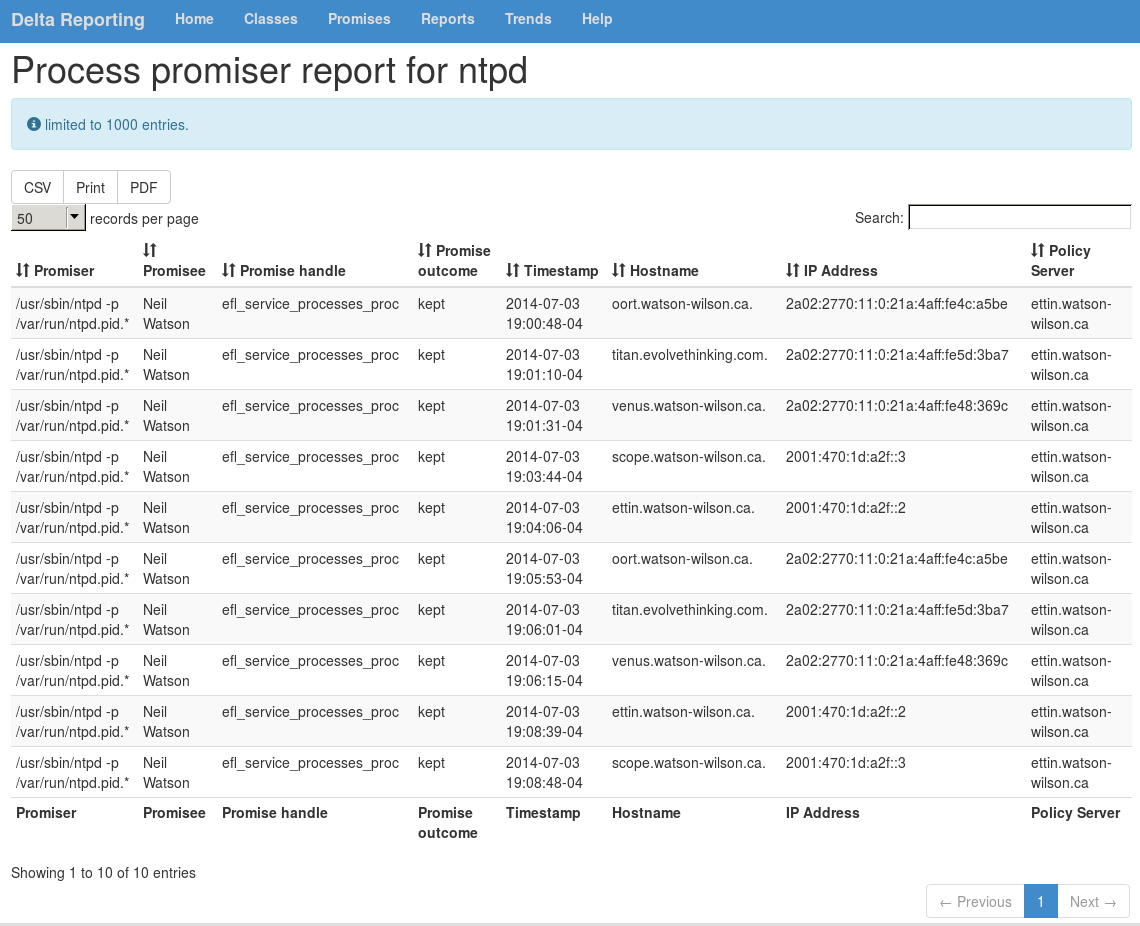CFEngine best practices: deployment, upgrades, and scaling

Part 3 of CFEngine best practices.
Version control
Put your CFEngine policy and supporting programs, data files, and documentation into version control. Like any other code you'll benefit from knowing its history. You can use branches to promote new policy from testing to production. I recommend using three branches: dev, qa, and production. Have servers and agents dedicated to each branch. The greater the variety of hosts in each branch, the greater the chance of catching bugs early. Always edit code in development only and promote those changes to qa and then production.
I frequently use cf-agent to pull new policy into masterfiles directly from version control. This provides automatic deployment upon commit. EFL has a ready to use bundle, efl_rcs_pull to handle RCS pulls, and it works with most RCS products.
Upgrading from CFEngine 2
Because CFEngine 3 is not backwards compatible with CFEngine 2 the upgrade path is steep and rocky. Many are just now starting this climb. The best upgrade path is to set up separate CFEngine 3 servers, and install CFEngine 3 on your clients while continuing to use CFEngine 2. CFEngine 2's cfagent can run in parallel with the CFEngine 3 cf-agent. The two versions do not share any common files so there is no overlap. They do share common directories; the most important is inputs.
When you bootstrap CFEngine 3, using its built in bootstrap feature, cf-agent will delete all files in inputs including any related to CFEngine 2. If you want to run 2 and 3 in parallel you'll need a wrapper script around CFEngine 3's bootstrap process to backup and restore CFEngine 2's inputs. here is an interesting discussion on this topic. With both agents running in parallel you can reduce your CF2 policy and increase your CF3 in gradually.
Upgrading from CFEngine 3.n to 3.n+1
Steps to upgrading CFEngine, hyperbole
Test
Test
Repeat previous steps
As I said in part 1 of this series, mistakes in CFEngine will be horrifyingly duplicated to all of your hosts. This can be a career limiting event. A new version of CFEngine can expose pre-existing bugs in your policy, or introduce its own new bugs. An example of the former: in version 3.5.0 the syntax checker became more strict, reporting errors that previous versions missed. Examples of the latter include many fixed and outstanding regression bugs. Trust is earned. Make CFEngine, and any other software, earn your trust. Here's a more practical approach to upgrading.
Steps to upgrading CFEngine, practical
Keep watch on CFEngine bug and mailing list traffic.
Keep policy compatible with both old and new versions until entire upgrade is complete.
Upgrade the development server.
Upgrade clients in batches.
Repeat server and client upgrade steps for qa and production.
As release candidates come out, you'll get a chance to experience and see what others experience with the proposed new version. Watch the bugs that get resolved and those that remain open. There may be new syntax or features that are not compatible with your current version of CFEngine. Do not consider these until after the upgrade. Be sure your policy runs properly on both versions. When you are ready to take the plunge, upgrade the server first. When it passes all tests proceed with clients, in small batches, enlarging the batches as you gain confidence.
Reporting tools like Delta Reporting log the promise and class status of all your agent hosts. This information can help you spot problems in your upgrade and in normal production.
Figure 1: Delta Reporting showing an ntp process promise on multiple
hosts

Upgrading policy
New versions of CFEngine ship with new base policy. The base policy is in its own repository so you can upgrade it between CFEngine releases. Merging this new policy with your existing one is always tedious, but your regimented use of version control will make this easier. To reduce the merging work limit the amount of changes you make to the shipped policy. I usually only changes inputs, bundlesequence (to call my master methods bundle), and variables and options set in def.cf.
Tip If you plan to use CFEngine on an IPV6 interface, beware that the default policy will not work. You must change the server control body, setting bindtointerface to a double colon (::). See here and here for more information.
Handling many clients with a single server
A single server can handle thousands of CFEngine clients, but there are tricks to extend that number further. This simplest is splaytime. The schedule daemon cf-exed checks its current hard classes versus the time classes specified in its control body schedule attribute. If there is a match, the exec_command is run. If you have a thousand hosts all of them will start at the same time causing the server needless load and dropped connections. Splaytime is set in cf-execd's control body. Each agent generates a deterministic time between zero and splaytime minutes and waits that amount of time before running the exec_command. Thus your agent starts are splayed. Always set splaytime to the interval or your run schedule less one minute.
Cf-serverd is a file server. Some agent promises can request a lot of files from the server. To reduce this load, reduce the frequency of these promises. Use the ifelapsed action body attribute. An ifelapsed of 60 means the agent will not evaluate the promise more than once every 60 minutes. This feature can also reduce agent load by running high load promises, like packages, less frequently.
Redundant CFEngine servers
It would be nice if we could bootstrap an agent to multiple servers. Sadly, this feature does not exist at this time, but you can vote for it. In the mean time we must perform some tricks to make the agent contact redundant policy servers.
A copy_from body has a servers attribute that takes a list argument. In spite of having no multi-server bootstrap, the agent can already talk to multiple servers by populating the servers list. The agent tries each server in the list, in order. Set your policy to randomize this list using the shuffle function and you add load balancing.
The trouble with having no multi-server bootstrap is that we are left to handle key exchanges between agents and multiple servers. There are multiple ways to do this. I won't go into detail here, but give you a high overview instead.
Recall that for agent and server to trust each other there must be access promises, each must have the other's public key stored in the ppkeys directory, and the server's allowconnects and allowallconnects must include the agent. You can have all redundant servers share the same private keys or give them separate keys. Either way you'll need to sync some or all of the ppkeys directory between the servers so that each has a copy of all agent public keys. Also, ensure that each client has a copy of each server's public key.
Make policy that makes the agent self reliant
In spite of all your efforts, at some point your agents will not be able to reach the server. What then? The agents will not be able to fetch new policy, but they should be able to run existing policy if the policy is robust enough. One best practice is to cache files that are copied from the server. Rather than promising the final promiser file direct from the policy server, promise the file from the policy server to a cache location (/var/cache/cfengine/), then promise from the cache location to the final location. If the server is unreachable the agent cannot promise any new files, but it can continue to promise existing ones.
Figure 2: Caching source files
files:
"${efl_c.cache}/${${config_file[${s}]}}" -> { "${${promisee[${s}]}}" }
comment => "Cache the source file",
handle => "efl_service_files_cache",
create => "true",
copy_from => efl_cpf( "${${source_file[${s}]}}", "@{${${server[${s}]}}}" );
"${${config_file[${s}]}}" -> { "${${promisee[${s}]}}" }
comment => "Promise contents of configuration file from the cache",
handle => "efl_service_files_config",
create => "true",
copy_from => efl_cpf( "${efl_c.cache}/${${config_file[${s}]}}", "localhost" );
Limiting agent input files
When using CFEngine's bootstrap feature all the contents of the server's masterfiles directory is copied to the agent's inputs directory. You may want to limit which input files are copied. A good approach is to keep only the most basic files in masterfiles, including policy for the agent to download other files from directories outside of masterfiles.
You should only try to limit files that contain private information, the same information what you would encrypt. Try not to be too paranoid about limiting inputs because it adds complexity.
How will you restrict agent access to private data? You cannot use classes because any agent can have any class using the -D command switch. You must limit access using server access promises.
Summary
Use version control, everywhere.
CFEngine 2 and 3 can run in parallel for gradual migration.
Upgrade policy and CFEngine 3 with extensive planning and testing.
Use splaytime and ifelasped to reduce agent and server load.
Make CFEngine policy servers in redundant pairs.
Make policy reliable even when the server is unavailable.
You can limit selected inputs to agents, but do so with caution.
